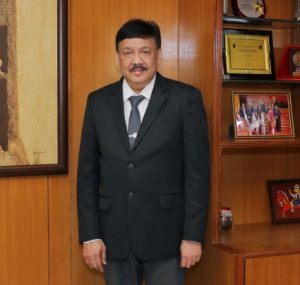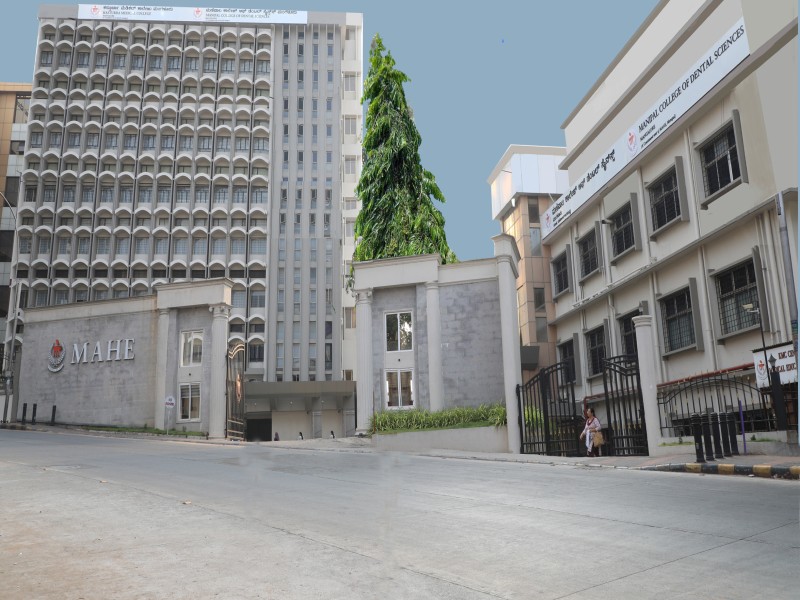Tradition, Innovation, and Impact at MAHE
– Dr Dilip G. Naik, Pro Vice Chancellor, Manipal Academy of Higher Education (MAHE)
Since its inception, MAHE Mangalore has been actively shaping healthcare education, and our effort has been to continue to honour its reputation for academic excellence in medicine, dentistry, and allied health while placing equal emphasis on adaptability, innovation, and social relevance. To this end, our curriculum is shifting toward outcome-based education, where competencies in problem solving, critical thinking, ethics and empathy are as valued as technical skills. We are attempting to transform from a traditional health sciences campus into a living, growing space that anticipates the future and prepares our students to lead it. Already, we have integrated emerging fields like genomics, artificial intelligence, and data-driven healthcare into our programs.
Interdisciplinary learning is the direction that education systems worldwide are headed today, but it is already deeply embedded in the MAHE Mangalore experience. We are known to be a premier multidisciplinary university because interdisciplinarity has been part of our DNA since birth. We leverage this advantage in every way we can. On campus, that philosophy translates into shared seminars, joint case studies, and simulation labs that mirror real-world clinical environments. Students learn to value different perspectives from the start, building a culture of teamwork that mirrors the professional healthcare landscape. We believe that the best patient outcomes emerge when healthcare professionals work as cohesive teams, and that starts with how they’re trained.
While we keep an eye on the future, we have yet to learn a lot from the past, and so we treat Mangalore’s heritage as an educational asset. Our students understand that to treat effectively, they must see the person behind the patient; their culture, values, and community included. This understanding is rooted in kindness and strengthened through coastal health outreach, maternal and child health camps in rural areas, and partnerships with local NGOs. These are experiences that help students fortify clinical expertise with cultural sensitivity. One of the campus’ greatest strengths is our proximity to major hospitals and healthcare hubs which entails an abundance of clinical material, hands-on experience and vast research potential. This, coupled with our emphasis on cultural sensitivity and soft skills, makes them as competent in empathy and communication as they are in clinical practice.
 Students engage with patients from early in their education, progressively taking on more complex cases under close supervision. This is true especially of our postgraduate programs, which are structured to blur the lines between research, clinical practice, and innovation. From day one, students are immersed in hands-on clinical responsibilities with access to advanced laboratories, patent support offices, and interdisciplinary innovation hubs. Postgraduate students are encouraged to bring their ideas to life in ways that have real-world impact, and we have created an environment that sustains and supports their innovative potential. We’re reimagining the campus as a space that supports the whole student, which includes their mind, body, and intellect. The idea is simple: when students feel safe, supported, and inspired, they’re free to innovate, lead, and grow, and not just as healthcare professionals, but as balanced individuals. Wellness initiatives range from mental health counseling and mindfulness spaces to ergonomic consultation clinics and collaborative learning zones.
Students engage with patients from early in their education, progressively taking on more complex cases under close supervision. This is true especially of our postgraduate programs, which are structured to blur the lines between research, clinical practice, and innovation. From day one, students are immersed in hands-on clinical responsibilities with access to advanced laboratories, patent support offices, and interdisciplinary innovation hubs. Postgraduate students are encouraged to bring their ideas to life in ways that have real-world impact, and we have created an environment that sustains and supports their innovative potential. We’re reimagining the campus as a space that supports the whole student, which includes their mind, body, and intellect. The idea is simple: when students feel safe, supported, and inspired, they’re free to innovate, lead, and grow, and not just as healthcare professionals, but as balanced individuals. Wellness initiatives range from mental health counseling and mindfulness spaces to ergonomic consultation clinics and collaborative learning zones.
While our approach to student development is quite comprehensive already, we recognize that healthcare today is global by nature, and our students need broader exposure to develop internationally competitive competencies. That’s why MAHE Mangalore actively maintains academic relationships with institutions in USA, UK, Australia, Germany, Netherlands, Japan, Malaysia and Thailand. We want our students to attend summer schools in Germany, for example, train in tropical medicine in Thailand, or observe robotic surgery in Japan. With opportunities like these, they gain unparalleled awareness and the confidence to practice anywhere in the world.
Our vision is to offer a standard of informed care in the ranks of leading health science hubs globally. So far, we’re fully invested in creating a tech-forward campus where education and patient care are enhanced by initiatives like AI-enabled diagnostics, personalized learning analytics, telemedicine outreach, and simulation-based training, without compromising on humane care. By 2030, MAHE Mangalore should emerge as a transformative force not only in academia but also in public health, leadership, social innovation, and regional development. We want to be a place where brilliance meets purpose and learning leads to lasting impact.
(Taking charge as the pro vice-chancellor in 2020, Dr. Dilip G. Naik has been driven by the objective of steering his alma mater MAHE Mangalore into the future of healthcare education. Previously, he served eight years at Al Arab Medical University in Libya and assumed leadership roles, including Dean, at MCODS Mangalore before signing up with MAHE as pro vice-chancellor. He has co-authored the Southeast Asian Edition of Carranza’s Clinical Periodontology, conducted national and international multi-centric clinical trials, and introduced innovations in technology, curriculum, and clinical training)
Also read: MAHE: Revolutionising healthcare through world-class Health Sciences education
















Add comment